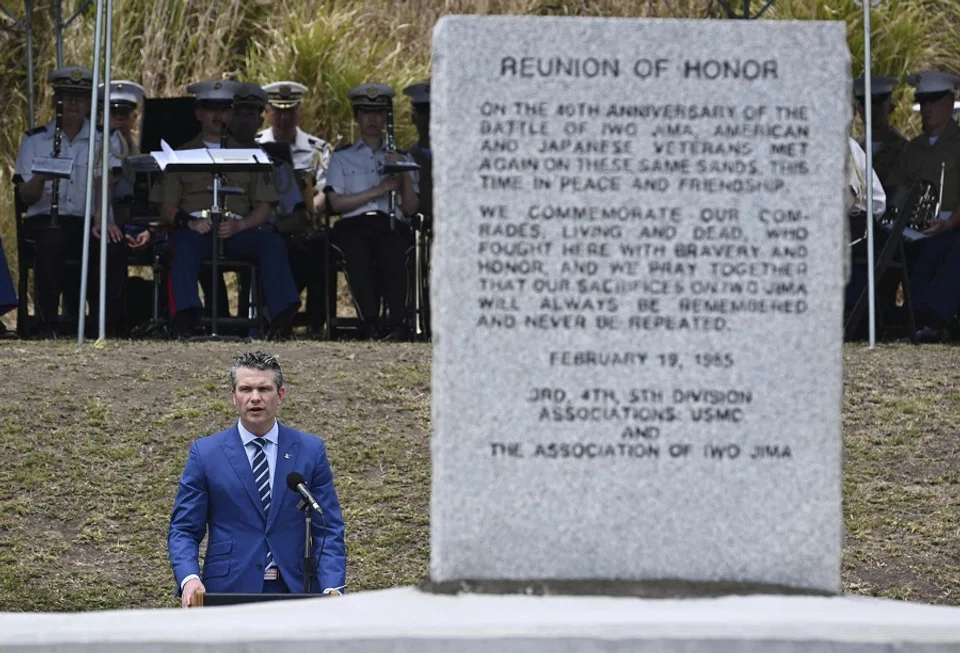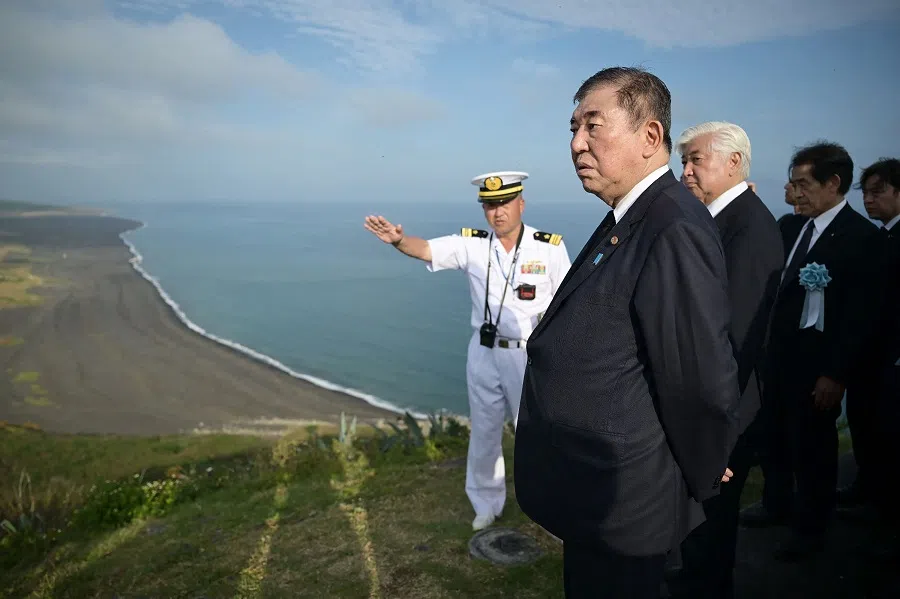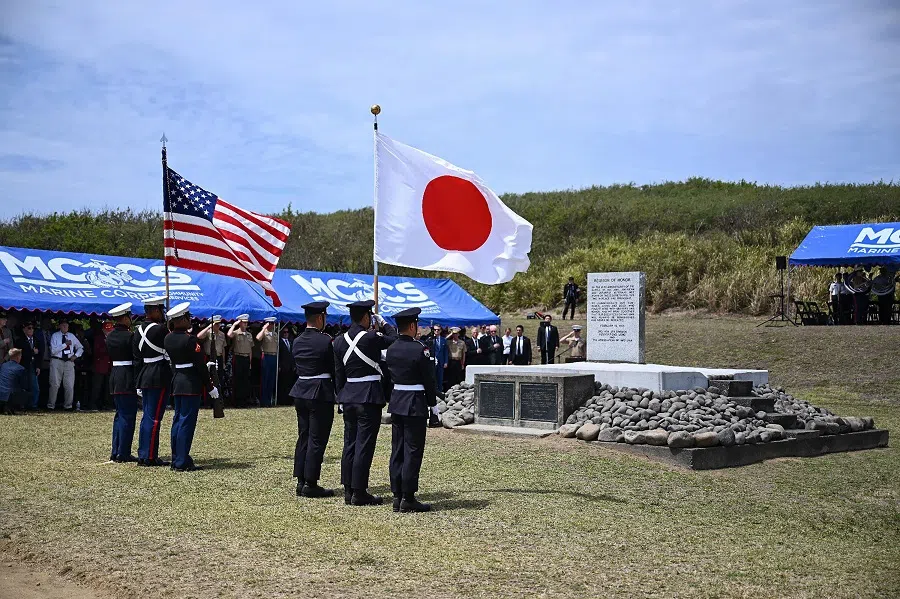Would Hegseth’s words be heard at Normandy? Rethinking double standards in WWII remembrance
Reflecting on US Defence Secretary Pete Hegseth’s speech at Iwo Jima recently, academic Jin Kai points out that Japan’s strategic importance as a core ally in East Asian geopolitics has been prioritised, while the wartime history between the US and Japan has largely been relegated to the past.

In international politics, can the same historical events, or different aspects of the same history, be interpreted in varied or tailored ways?
“General Kuribayashi, led his soldiers and sailors with stoicism, determination, and bravery.”
“Nearly all who so bravely fought here are gone, their hallowed memory lives on.”
“We are all proud to bear brief witness to the bravery, courage, and sacrifice that occurred on this battlefield.”
“Their brave example inspires us and steels our resolve.”
... US discourse — including official records, public consensus and the Hollywood film industry — has predominantly been characterised by strong condemnation, with an emphasis on the Allied fight to defeat the Nazi regime and its forces.
Double standards?
These remarks were among the notable statements made by US Secretary of Defense Pete Hegseth in his speech at the 80th Reunion of Honour Ceremony at Iwo Jima, Japan, on 29 March. While these comments may seem somewhat striking, especially the “his soldiers and sailors with stoicism, determination, and bravery” part, they may not be entirely unexpected, considering the US’s historical role in reshaping post-war Japan and the fact that Japan is now a key strategic ally of the US in the geopolitics of the region that once was called the Far East in war time.

But how would the reaction differ if the location of this speech were changed to memorial sites such as the Battle of the Bulge, the Normandy landings or even the Jewish concentration camps in Europe? How might the international community, including the Europeans and the Americans, respond?
In fact, it is exceedingly rare for US officials to commend Nazi Germany’s military efforts, for example, German soldiers’ “stoicism, determination, and bravery” in World War II, in light of Nazi regime’s horrific atrocities, including the Holocaust, and its aggressive expansionism. In the post-war period, US discourse — including official records, public consensus and the Hollywood film industry — has predominantly been characterised by strong condemnation, with an emphasis on the Allied fight to defeat the Nazi regime and its forces.
Japan’s strategic importance as a core ally in East Asian geopolitics has been prioritised, while the wartime history between the US and Japan has largely been relegated to the past.
Japan an exception?
When it comes to Japanese militarist aggression history during World War II, the attitude of the US, especially among the top policymaking groups, seems to be characterised by a mix of “generosity” and “ambiguity”. The Japanese emperor was preserved, the Yasukuni Shrine was allowed to enshrine Class A war criminals without being seriously condemned, and the aggressive actions of the Japanese military across the Indo-Pacific were sometimes framed as historical ashes that need not be held grudges, for example, by the Chinese and the Koreans.
Even at Iwo Jima, the island in the West Pacific where the US suffered 25,000 casualties to secure victory in 1945, the final resistance of the Japanese army was now lauded as brave and heroic, and “their hallowed memory lives on”. What memory? Perhaps Pete Hegseth intended to refer to all combatants in the Battle of Iwo Jima, including both American and Japanese troops. By mentioning “Japanese and American warriors” in his speech, he undeniably included the intense Japanese resistance as well.
So, what makes Japan’s imperialist past different?

Was that merely a courtesy in the host’s yard? Yet, there is no room for such politeness and ambiguity in serious matters, as in the case of Nazi atrocities. The victory of the World Anti-Fascist War certainly includes the final victory over Imperialist Japan in the Asia-Pacific region, and the Americans also did pay a huge price, among other allies, including China.
Or, it may be plausible that the US has adopted a distinct historical narrative and geopolitical strategy in East Asia, or the former Far East. This perspective, regrettably, is not uncommon in both academic discourse and the media. In essence, Japan’s strategic importance as a core ally in East Asian geopolitics has been prioritised, while the wartime history between the US and Japan has largely been relegated to the past. The enduring tensions related to aggression among East Asian countries, however, are often regarded as matters for the region itself to address.
... is it because of the geopolitical needs of great power competition, for example, with an increasingly powerful but “disobedient” China?
This seems to be politically correct, but historically and culturally indifferent — at least the maybe “carefully designed” difference in attitude towards Nazi history and Japanese aggression history shows an obvious “double standard”.
Now, is it simply because it is Asia, or is it because of the geopolitical needs of great power competition, for example, with an increasingly powerful but “disobedient” China?
In the aftermath of World War II, the Jewish community’s reckoning with Nazi war criminals endured for decades. The West has consistently condemned Nazi Germany, and even Germany itself has enacted specific legislation, like the Section 130 and Section 86/86a of its Criminal Code, prohibiting extremist rhetoric and actions, which, for example, may recreate racial hatred and atrocities during wartime. Given this, it is clearly inappropriate to associate the atrocities committed during the war of aggression in Asia, like those anywhere else in the world, with terms like “bravery” or “hallowed memory” in any context.
Ultimately, we should keep in mind that what happened during that War, either in Europe or in the Far East, is an objective account of events, not a subjective narrative that can be delicately reinterpreted to suit any particular perspective.





